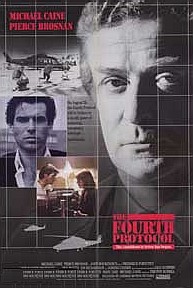Plot
In 1968, an East-West agreement is established to halt nuclear proliferation. One of its clauses, the Fourth Protocol, forbids the non-conventional delivery of a nuclear weapon to a target.
MI5 officer John Preston breaks into the residence of British government official George Berenson on New Year's Eve and finds a number of top secret NATO files that should not have been there. He reports his findings to high-ranking British Secret Service official Sir Nigel Irvine, who deals with the leak. Preston's unauthorised method of retrieving the documents embarrasses the acting Director of MI5, Brian Harcourt-Smith, and as punishment for his insubordination, Preston is relegated to lowly "Airports and Ports".
KGB officer Major Valeri Petrofsky is sent on a mission to the United Kingdom by General Govorshin, the head of the KGB. Govorshin's subordinate, Pavel Borisov, complains to his old friend General Yevgeny Karpov, about his department being stripped of resources and personnel, particularly his star officer Petrofsky. A surprised Karpov quietly investigates and learns about Petrofsky's unsanctioned mission – to violate the Fourth Protocol by assembling and detonating an atomic device as a false flag, to appear to be an American nuclear accident at a nearby military base, intended to strain British-US relations and strengthen the anti-nuclear movement in advance of an election in favour of the Soviet Union.
In Glasgow, a Soviet sailor is struck by a truck while fleeing from a port guard. Among the dead man's possessions, Preston finds a disk of polonium, which could only be useful as a component of a detonator for a bomb. He informs Harcourt-Smith, but is promptly suspended, as Harcourt-Smith believes that Preston is manufacturing a fake incident to work his way back into MI5. Preston, however has the confidence of Sir Bernard Hemmings, the gravely-ill Director of MI5, as well as Irvine, who is happy to sidestep Harcourt-Smith's directives. Preston sets to work and eventually comes across Winkler, a known Czech KGB agent, and tails him from the airport.
Meanwhile, Petrofsky meets KGB agent Irina Vassilievna, a bomb expert who is pretending to be his wife. Under her guidance, they assemble the device from the smuggled items and she sets it on a two-hour delay as they agreed on. Unbeknownst to Petrofsky, Vassilievna follows her own orders, resetting the delay to zero. After having sex with Petrofsky, she finds his own secret order to eliminate her and tries to warn him about the double-cross, but he kills her before she can.
Afterwards, Petrofsky is observed contacting Winkler. Preston tracks him to Ipswich, loses him, then finds him again. Preston eventually realises that Petrofsky's target is RAF Baywaters, and locates Petrofsky's house, which lies right next to the base.
When Petrofsky starts to activate the bomb, on an impulse, he checks the timer first and realises he has been betrayed. At that moment, an SAS team storms the house and during a struggle, Preston subdues and disables Petrofsky. To Preston's outrage, one of the SAS team cold-bloodedly shoots and kills Petrofsky, explaining bluntly afterwards that he had orders to do so.
At Hemmings' funeral, Preston is unsurprised to find Irvine secretly meeting with General Karpov. Preston had become suspicious when known KGB agent Winkler was used as a courier, making it easy to follow him, and also when Petrofsky was killed instead of being captured for questioning. He surmised that discrediting Govorshin would benefit both Irvine and Karpov (sneering to both that keeping hold over their careers is all that matters to them). Preston does not see any point in exposing them and leaves after expressing his contempt for their cynical power play (Irvine secretly assuring Karpov that they have control over Preston, as they covertly observe him reunite with his young son).
Production
Michael Caine read the draft manuscript of the novel and suggested to Forsyth that they produce a film together. They hired George Axelrod to write a script and John Frankenheimer to direct, but were unable to raise finance. Axelrod and Frankenheimer left the project, Forsyth wrote the script himself and they got a new producer and director. [1]
Even though the book sold over seven million copies Forsyth spent an estimated 18 months raising the finance. "Freddie had a lot of difficulty raising the finance for this film, particularly from the Americans, because I think they are running scared of terrorist movies," said Caine. [2]
Eventually half the money came from private sources, half from corporations, with 70% from Britain and 30% mostly from the US. [2] Half the budget was from a private investor, an admirer of Forsyth. The author and Caine invested their fees which came to an estimated £1 million. [3]
Filming took place in June 1986 over eleven weeks. "What I want to do is make a film of my story, [and] not a film of my book," said Forsyth. [3]
